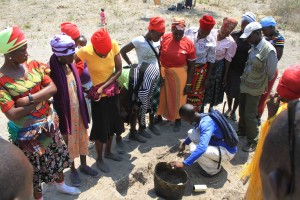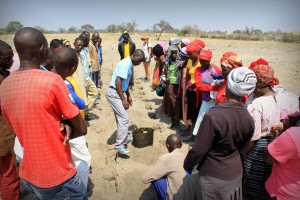We lead collaborative research to help farmers develop more productive, sustainable farming techniques, and more resilient cropping strategies.
Recently, we organized and hosted several workshops in the region to bring farmers and technicians together to learn, discuss, and begin practicing planting techniques known as conservation agriculture. Instead of plowing and broadcasting seeds, farmers dig basins, conduct minimal tilling, and add manure and mulch, which helps boost soil nutrients and conserves moisture. All of this is harder work but offers farmers the potential to boost their yields in smaller area–and over more seasons—thus making it easier for them to patrol and protect their fields from elephants. Over 40 farmers in the Panhandle are now pioneers in these techniques and sharing their experiences, challenges, and success with others. Each year, we are hearing from more and more farmers who want to try.

Over 40 farmers in the Okavango Panhandle are now pioneers in these techniques and sharing their experiences, challenges, and success with others.

A big part of what we do at Ecoexist is work with farmers to make their crops more productive and less vulnerable to elephant raids. This month, we hosted workshops to bring farmers and technicians together to learn, discuss, and begin practicing planting techniques known as “conservation agriculture.” Instead of plowing and broadcasting seeds, farmers dig basins, conduct minimal tilling, and add manure and mulch, which helps boost soil nutrients and conserves moisture. All of this offers farmers the potential to boost their yields in smaller areas–and over more seasons—making it easier for them to patrol and protect their fields from elephants.
As we are coordinating exchange visits between farmers, we are also initiating collaborative research to learn more about the use of short cycle crops for preventing crop-raiding. In 2014, we created an Agricultural Research Working Group, bringing together participants from the Departments of Agriculture, Agricultural Research, and Wildlife and National Parks. Key concepts for the Working Group are avoidance, resistance, tolerance—all ways of thinking about how farmers can be resilient to crop-raiding elephants. We are working together to find ways farmers can plant early and harvest early so they avoid the time of year when elephants pass through their fields, and we are experimenting with crops that are unpalatable or resistant to elephants, or plants that can withstand crop-raiding.